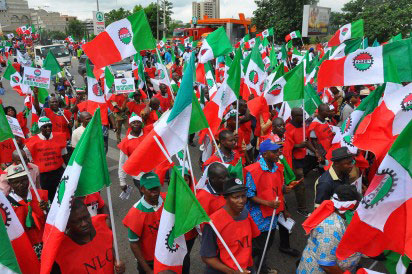Ben Ezechime, Enugu
The Chairman of Nigerian Labour Congress (NLC) in Enugu State, Comrade Fabian Nwigbo has lamented the non-implementation of N30,000 minimum wage by 18 states in the country.
The NLC chairman spoke on Monday in Enugu on the backdrop of this year’s democracy day celebration.
Nwigbo, said though Nigeria as a nation had made tremendous progress since 1999, there were still a lot to be done..
“The level of participation in the 2023 General Election showed there is progress and that we are moving forward as a country,” he said.
He appealed for improved workers’ welfare, adding that Nigerian workers were not well remunerated.
He regretted that a little minimum wage of N30, 000 was yet to be paid to workers by 18 states in Nigeria.
“What is N30,000 for a Nigerian worker who has family and pays rent, school fees and buys other necessities of life?
“I am appealing to the Federal Government and States Government to have mercy on Nigerian workers and improve their working conditions,” Nwigbo said.
Olu Omotayo, Esq, Enugu based civil rights lawyer, noted that development in a democracy was a gradual process and called for strengthening of the various institutions in the country.
He said that security and economy should be strengthened and looked into by the new government, saying that “we cannot have economic and social developments without adequate security.
“Our democracy is gradually developing as we are not the same as we were in 1999.
“The present government should go back to the drawing board and see that the issues of security and economy are addressed to alleviate the plight of Nigerians,” Omotayo advised.
Also contributing, Dr Alex Ogbonnia, National Publicity Secretary of Ohanaeze Ndigbo Worldwide, said the most important thing was that Nigeria had moved from dictatorship and imperialism to entirely a paradigm of democracy.
He added that Nigeria was able to manage its diversity that was so unique.
Ogbonnia said that since 1999, political elites struggle among themselves to get power and corner the nation’s resources.
He noted that the objectives of many politicians were not for the people’s interest but on how to aggrandise themselves and their cronies with wealth.
“It is no longer government of the people but government of the few, by the few and for the few,” he said.
He called for true independence of the National Electoral Commission (INEC) and the Judiciary for effective discharge of their duties without any form of bias and favour.
He explained that where the president and state governors appoint electoral and judicial officers, they would no longer be independent and it hinders the doctrine of the separation of power.
“Our judiciary is a cobweb where small flies are always caught and big ones are allowed to break it and pass.
“There is no way an electoral body appointed by the president can conduct credible elections,” Ogbonnia said.

